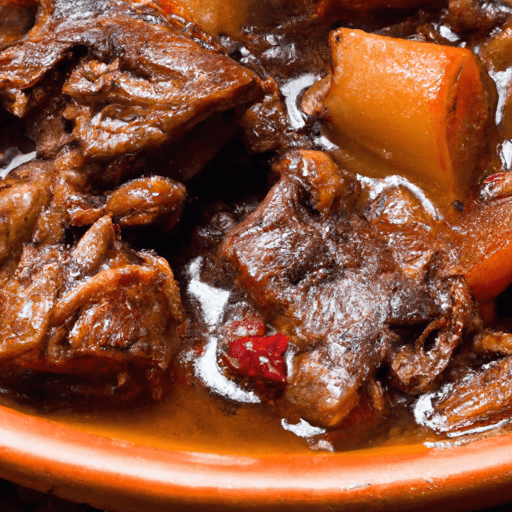Exploring the Delights of Boar Stew Meat
When it comes to indulging in a rich and flavorful stew, few meats can compare to the delectable boar stew meat. With its robust taste, versatility in the kitchen, and interesting culinary history, boar stew meat has become a favorite among cooking enthusiasts and foodies alike. In this article, we dive deep into the world of boar stew meat, exploring its taste profile, common uses, nutritional value, and intriguing facts.
A Gastronomic Adventure Awaits
Uniquely Flavorful
Boar stew meat boasts a distinctive taste that sets it apart from other meats. Its flavor is often described as rich, earthy, and slightly sweet with a hint of gamey undertones. This characteristic taste is the result of the boar’s wild diet, which includes foraging for acorns, berries, and other natural delicacies. This lifestyle imparts a unique flavor profile to the meat that is truly a culinary adventure for the taste buds.
Versatile in the Kitchen
Boar stew meat’s versatility allows it to shine in numerous culinary creations. Due to its inherently robust taste, it pairs exceptionally well with bold and aromatic ingredients. Commonly used herbs and spices include rosemary, thyme, juniper berries, and bay leaves. The meat’s inherent tenderness lends itself to various cooking methods such as slow-cooking, braising, and stewing. Whether it’s a hearty boar ragu, a succulent stew, or a flavorful chili, boar stew meat brings a touch of sophistication and depth to every dish.
Nutritional Powerhouse
Not only is boar stew meat a delight to the taste buds, it is also a nutritional powerhouse. Rich in protein, this meat provides essential amino acids necessary for muscle growth and repair. Additionally, boar meat is typically leaner than conventional pork, making it an excellent choice for those watching their fat intake. It also contains important minerals such as iron, zinc, and selenium, which are vital for optimal health and well-being.
Historical Significance and Fascinating Facts
Ancient Delicacy
Boar meat has a long and celebrated history in culinary traditions around the world. In ancient times, boar hunting was regarded as a prestigious and challenging pursuit. The meat was considered a delicacy, reserved for special occasions and feasts. This historical significance has shaped the perception of boar stew meat as an indulgent and sought-after ingredient to this day.
A Hearty Feast on Medieval Tables
During the medieval period, boar meat enjoyed immense popularity, particularly among the nobility. Boar hunts were grand spectacles, often culminating in lavish feasts where succulent boar dishes took center stage. These extravagant feasts showcased the culinary prowess of the time and cemented boar stew meat’s reputation as a delicacy fit for royalty.
Sustainable and Ethical Choice
In recent years, boar stew meat has gained attention for its sustainable and ethical qualities. Boars are known for their resilience and reproductive capabilities, making them a self-sustaining food source in many regions. Their population control is necessary to maintain ecological balance, making boar hunting an ethical practice in certain areas. Choosing boar stew meat not only indulges the palate but also supports sustainable food practices.
With its captivating taste, versatility in the kitchen, and intriguing culinary history, boar stew meat has captivated food enthusiasts for generations. Whether you’re looking to embark on a gastronomic adventure or simply want to expand your culinary repertoire, consider adding boar stew meat to your next cooking escapade. Let its rich flavors and vibrant history transport you to a world where taste knows no boundaries.
*dontforgettocite: “Title of Image” by Photographer, licensing
Boar Stew Meat
- Origin: Boar stew meat comes from the wild boar, a wild ancestor of the domestic pig. Wild boars are native to Europe, Asia, and North Africa and have been introduced to other regions around the world, including the Americas.
- Common Uses: Boar stew meat is often used as a flavorful and hearty ingredient in various stews and slow-cooked dishes. Its rich and robust taste makes it a popular choice for traditional rustic recipes in countries like Italy, Spain, France, and Germany. Boar stew meat can also be used in other preparations such as roasts, sausages, or ground into meatballs.
- Nutritional Benefits: Boar stew meat is a good source of high-quality protein, essential amino acids, and important nutrients. It is generally leaner than pork, with lower fat content and higher protein levels. Boar meat is rich in minerals like iron, zinc, and selenium. It is also a source of B vitamins, particularly thiamin, niacin, and vitamin B6.
- Unique Properties: Boar meat often has a distinctive flavor profile. Due to their wild diet and active lifestyle, wild boars develop more muscle and less fat compared to their domestic counterparts. This lean meat has a slightly gamey and earthy taste that some find similar to beef or lamb. The meat can be tougher than pork, but slow-cooking methods like stews help tenderize it.
- Historical Significance: Wild boar has been an important source of food for humans throughout history, especially in regions where it is indigenous. In ancient times, boar hunting was a prevalent activity, and boar meat often held cultural significance. It was highly prized and reserved for special occasions or consumed by nobility. Wild boar dishes can still be found in traditional cuisines, showcasing a connection to the culinary heritage of different cultures.
Please note that boar meat may not be widely available in some regions, and hunting restrictions or farming practices can impact its availability and sustainability.




Use the share button below if you liked it.
It makes me smile, when I see it.